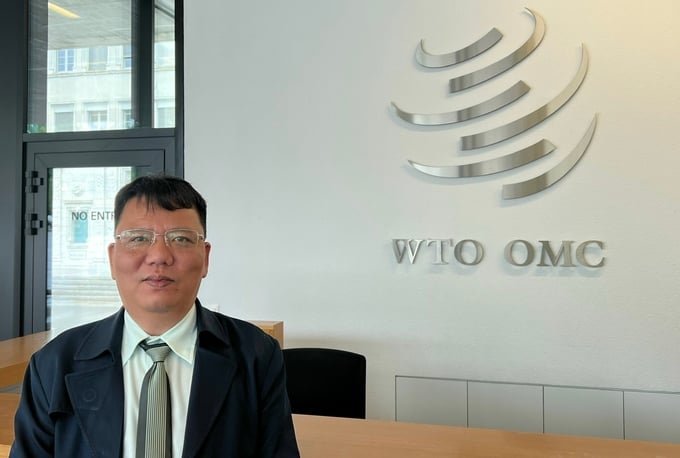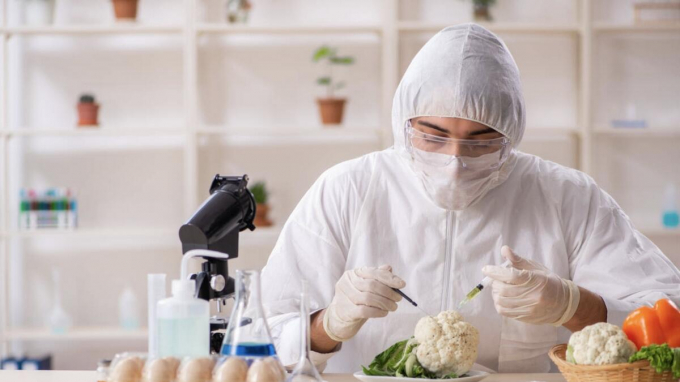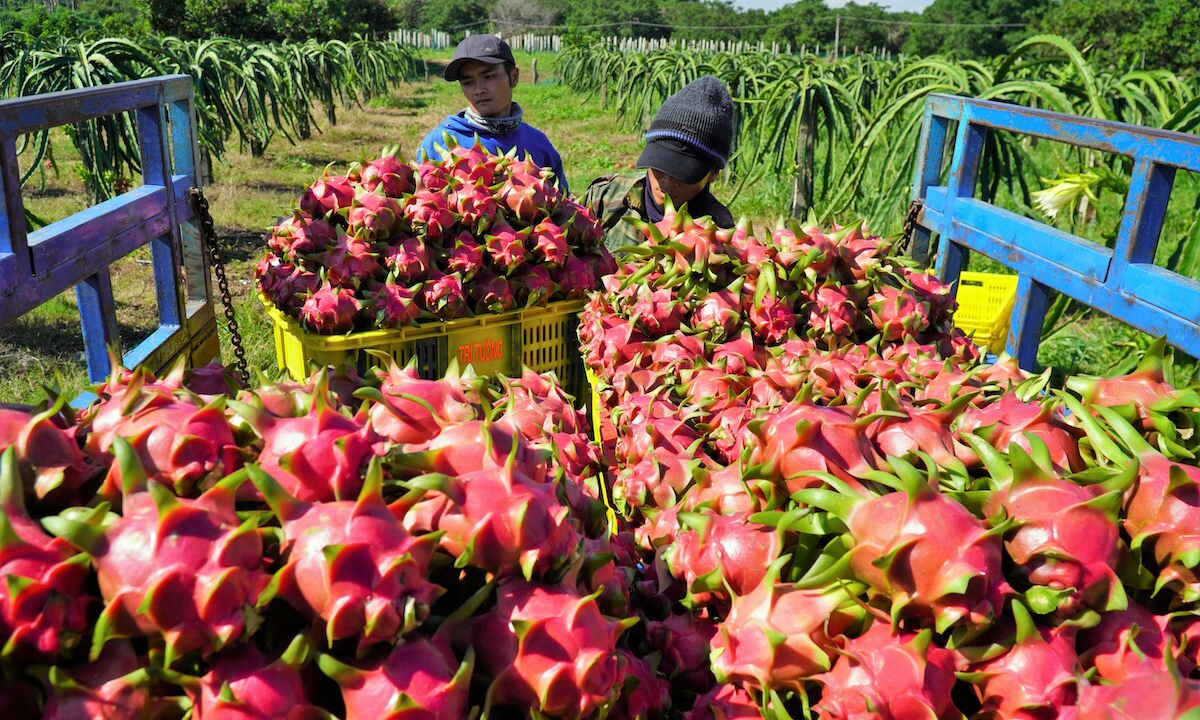November 28, 2025 | 01:07 GMT +7
November 28, 2025 | 01:07 GMT +7
Hotline: 0913.378.918
November 28, 2025 | 01:07 GMT +7
Hotline: 0913.378.918

Dr. Ngo Xuan Nam, Deputy Director of Vietnam SPS at the meeting of the SPS/WTO Committee.
According to reports, several supermarkets in the UK have reportedly stopped selling Vietnamese dragon fruit due to traces of pesticide residues that pose potential risks to consumers' health.
On the other hand, authorities in the UK are proposing to move Vietnamese dragon fruit from Appendix II (products that have been tested and granted a safety certificate in Vietnam before exporting) to Appendix I (products that must be physically verified and re-inspected at a 50% frequency at the port of destination before being allowed to circulate the market).
Based on Decision No. 1425/QD-TTg on appointing focal agencies for the implementation of the Vietnam - UK Free Trade Agreement (UKVFTA) issued by the Prime Minister on August 24, 2021, Vietnam SPS is responsible for exchanging information and implementing contents related to Sanitary and Phytosanitary measures (Chapter 6: SPS measures).
Changes to SPS measures applied to Vietnamese dragon fruits exported to the UK must be based on Chapter 6 of the UKVFTA. Accordingly, these changes must be notified to Vietnam's focal point, which is Vietnam SPS.
Vietnam SPS received Official Dispatch No. 409/QLCL-HTQT from the Department of Quality, Processing and Market Development on July 17, 2023. The Dispatch detailed UK's plan to strengthen sanitary and phytosanitary inspection on the Vietnamese dragon fruit.
The Department of Plant Protection responded with Official Dispatch No. 1892/BVTV-ATTPMT on July 26. Namely, the Department proposed to amend regulations related to sanitary and phytosanitary inspection of Vietnamese dragon fruit in the UK.

Vietnamese spices and vegetables were previously subject to a 50% inspection frequency, before being lowered to 20% in early 2023.
Subsequently, Vietnam SPS reported to the UK SPS focal point on August 2 regarding two contents. Firstly, Vietnam SPS requests the UK to maintain the inspection frequency for Vietnamese dragon fruit until both parties provide sufficient evidence.
Secondly, the agency requested the UK to provide risk assessment records with regards to the changes in the sanitary and phytosanitary inspection frequency of Vietnamese dragon fruit. Subsequently, the Vietnamese government will study the documents and provide its opinions on the issue.
After over one month since the last dispatch, Vietnam SPS is waiting for a response from the UK SPS focal point.
In response to Official Dispatch No. 5251/BCT-DB dated August 8, 2023, the Ministry of Industry and Trade of Vietnam issued Official Dispatch No. 182/SPS-BNNVN on August 11 to gather comments on the draft agenda for the meeting of the UKVFTA Trade Committee. Additionally, Vietnam SPS recommended the two aforementioned contents to be discussed at the meeting.
The Ministry of Industry and Trade is Vietnam's leading and coordinating agency in formulating, synthesizing proposals and receiving technical support from foreign partners in the implementation of UKVFTA. Moreover, the Ministry is the focal point for communication with countries implementing the agreement.
According to Official Letter No. 182, Vietnam SPS proposed the Ministry of Agriculture and Rural Development to assign the Department of Plant Protection as the focal point for SPS technical assistance. In addition, the Department was recommended to lead the study of the risk assessment records with regards to the changes in the sanitary and phytosanitary inspection frequency of Vietnamese dragon fruit.
This activity will be deployed after receiving information from the UK's SPS focal point on dragon fruit in combination with the results of the UKVFTA Trade Committee Meeting held on August 24.
High quality Vietnamese dragon fruit has been exported to various markets around the world, including the European Union and the United Kingdom. Vietnamese businesses export approximately two thousand tons of fresh and frozen dragon fruit to the EU market on an yearly average.
The inspection frequency for dragon fruit is 20%, as regulated by the EU. This level of inspection previously caused the Vietnam Fruit and Vegetable Association to request help from related departments, ministries and branches.
According to the Association's assessment, a 20% inspection frequency is both excessive and severe to Vietnamese fruit and vegetable products. The Association purports that after collecting samples for inspection, these products must be discarded.
Consequently, businesses and farmers lose a portion of their goods' value including product prices and extremely high logistics costs. On the other hand, product inspection takes at least four days in order to reach the regulated frequency, which can negatively affect the quality of goods when they are sold on the market.
If the inspection frequency is increased to 50% as per the UK authorities' proposal, Vietnamese businesses will face considerable challenges when exporting to this market.

Dragon fruit is one of Vietnam's key fruit and vegetable export products with a turnover of roughly 600 million USD in 2022.
In response to this issue, Mr. Ngo Xuan Nam, Deputy Director of Vietnam SPS, confirmed that agency is requesting the UK to provide risk assessment documents with regards to the changes in the sanitary and phytosanitary inspection frequency of Vietnamese dragon fruit. According to statistics compiled by the Department of Plant Protection, between 2020 and July 2023, Vietnam has exported 193 lots with 625 tons of fresh and frozen dragon fruit to the market. Regarding the UK market, Vietnam SPS has not received any notice of violation to date.
In addition, Vietnam SPS has been coordinating with experts to organize training on SPS regulations to specialized agencies, industry associations, businesses, cooperatives and related parties. Accordingly, participants will be able to promptly adjust to market requirements and improve the quality of Vietnamese agricultural products.
The objective of the training program is to provide businesses and farmers with accurate information and prevent misinformation, which can be detrimental to domestic agricultural production, especially for businesses and organizations producing, packaging and exporting dragon fruit.
Vietnam SPS aims to coordinate with the UK on transparent solutions to reduce inspection frequency and promote export activities.
Thanks to support from domestic businesses, state management agencies and specialized agencies, EU approved Vietnam's request to reduce the inspection frequency for spices and instant noodles products.
“The EU commends Vietnam's open and transparent cooperation efforts. The EU also requested Vietnam to share statistical data on sanitary and phytosanitary measures, as well as comply with regulations. Thanks to the government's timely and drastic actions, Vietnam has removed the trade barriers on two key export items, spices and instant noodles, within the first six months of 2023", emphasized Mr. Nam.
Vietnamese dragon fruit has consistently yielded the highest fruit export turnover within ten consecutive years. However, the export value of this product has shown signs of decline since 2022, giving way to durian. According to the General Department of Customs, Vietnam's dragon fruit export turnover reached over 630 million USD in 2022. However, this figure has shown signs of steady decline in the first six months of 2023.
Translated by Nguyen Hai Long

(VAN) According to Mr. Vo Minh Thanh, Director of the Tay Ninh Department of Agriculture and Environment, Resolution 57 has created a new development pathway for the locality, shifting from traditional toward modern agriculture.
/2025/11/26/4909-2-154329_878.jpg)
(VAN) Pearl grouper farming in HDPE cages not only delivers economic efficiency but also contributes to protecting the environment, creating jobs, and promoting marine-based experiential tourism.

(VAN) The model of making a living under the forest canopy through the agroforestry system in Van Son commune, Bac Ninh province, is expected to generate an annual income of approximately VND 30 million/ha.

(VAN) Many enterprises in Can Tho are harnessing natural energy and reducing greenhouse gas emissions in their production processes, thereby contributing to the promotion of a sustainable green transition.
/2025/11/24/3536-2-112800_176.jpg)
(VAN) Dong Nai now has tens of thousands of hectares of forests certified for sustainable management, and this area will continue to be expanded in the coming period.

(VAN) Vinh Ha hamlet (Dai Xuyen commune, Hanoi) is shifting away from small-scale farming as households adopt bioscurity into their breeder chicken models.

(VAN) Heavy rains make aquatic species more vulnerable to disease. Proactive water management and high-tech systems help farmers prevent outbreaks and protect yields.